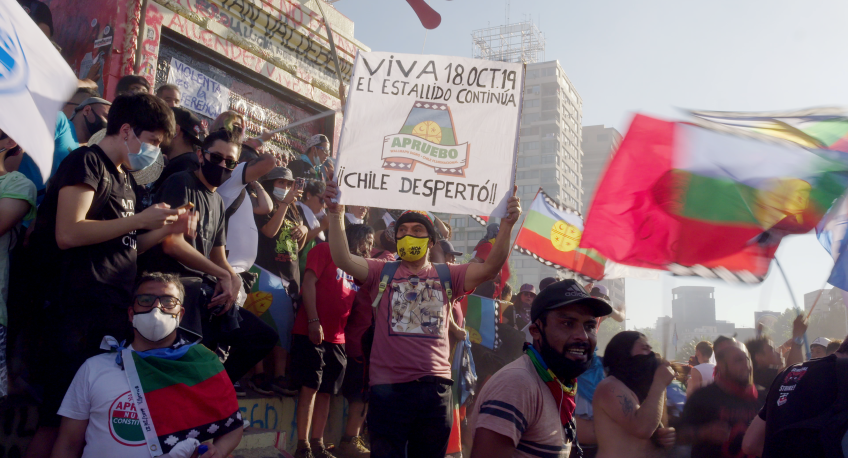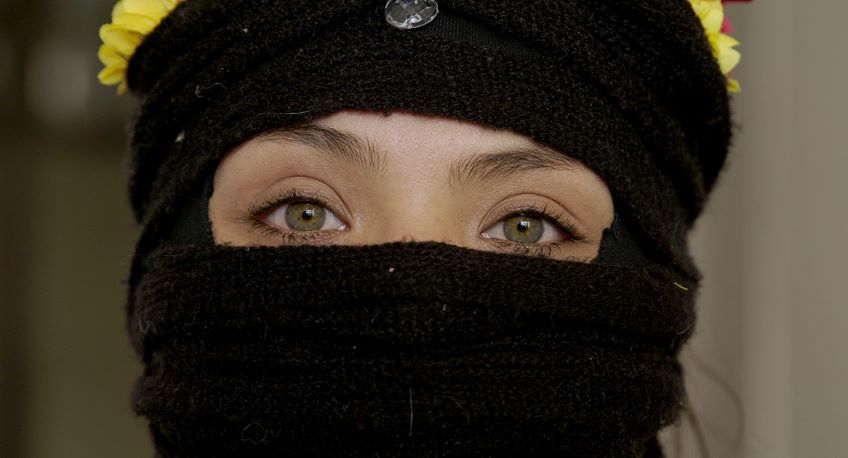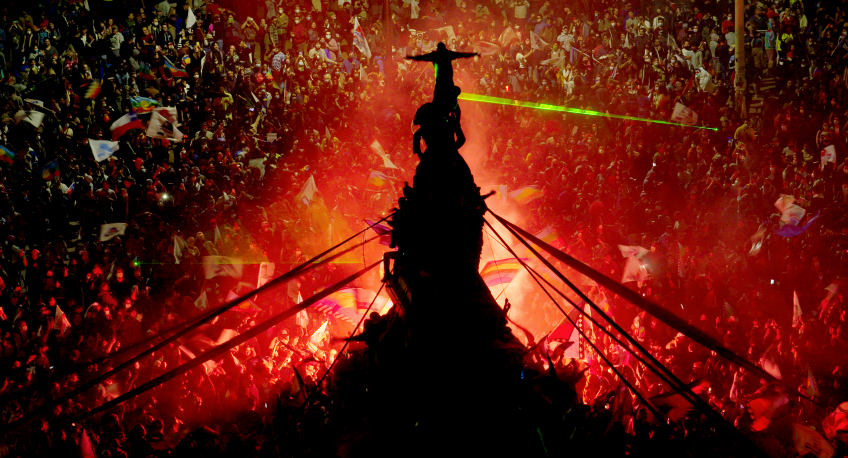Joyce Glasser reviews My Imaginary Country (June 9, 2023) Cert 15, 83 mins.
In Patricio Guzmán’s last film, The Cordillera of Dreams, the third in his powerful trilogy on the legacy of the Pinochet regime, we see the names and young ages of victims carved on paving stones taken from the Cordillera, the mountain range of the Andes Mountains that runs like a spine along the country. My Imaginary Country opens with stones being hammered and hacked from the pavements of Santiago and used as the weapon of choice in a revolution that took Guzmán and even those caught up in it, by surprise. Hearing the news, on 18 October 2019, Guzmán prepares to film in Santiago the following year and this film is the enthralling, insightful and emotional result.
The Cordillera of Dreams ends with the director making a wish that his country finds its lost joy – and its memory. His life’s work has been to keep that memory alive, although the pessimism in Cordillera of Dreams was obvious. Now, thrilled at the idea of coming full circle at the age of 81, he declares that at last Chile has recovered its memory. ‘The event I had been waiting for since my student struggles in 1973 finally materialised.’
The revolt began over a rise in the price of a subway ticket and spontaneously spread to the streets. On October 18, 2019, 1.2 million people gathered in Plaza Baquedano, the largest protest in Chilean history. President Sebastián Piñera declared a state of emergency and called in the army. ‘Seeing soldiers in the street reminds the Chileans of a coup d’état. The people’s rejection of them was immediate’ Guzmán observes.

Unlike the 1973 coup d’état that saw President Salvador Allende murdered, in 2019, there were no political parties, no leaders or ideologies. The young crowds acted with a single purpose like one body. The country, led by its women, erupted after years of oppression.
Guzmán has been living in Paris since he fled Santiago aged 32 with the reels of film that would become his iconic documentary, The Battle for Chile (1975-1979). Pablo Salas, a photographer and archivist of the Pinochet years who appears in The Cordillera of Dreams stayed behind in Chile and provides the historic footage. Samuel Lahu, the cinematographer of The Cordillera of Dreams is the cinematographer for the interviews. The powerful crowd scenes are intercut with terrific interviews with people from all walks of life – all women.
One masked woman with a nine-year-old son who she cannot afford to feed is protesting for him. A photographer is shot in the eye. Claudia Heiss, an intelligent political commentator talks about the total divorce between the armed forces and the civilian population. ‘Today with the police tactics we are paying the price for not acknowledging or resolving the problems inherited from the dictatorship.’
Four girls have written a “poem” that becomes a powerful protest chant against the corrupt and oppressive institutions of state. Women want justice – punishment for rapists and murderers – a living wage, pensions, freedom over their own bodies, dignity. The prevailing metaphor is rape and crowds point their fingers in unison at the country’s judges, singing, “the rapist is you”.

What all the protesters decide they want, and need, is a new Constitution. The government has no choice in the end but to call a referendum. 80% of the country voted for a Constituent Assembly to write a new constitution.
After the 1973 coup d’état, Pinochet dissolved Parliament. For years the building remained empty. Last time Guzmán filmed inside ‘it was a hive full of smoke and glasses of tea.’ Now it has regained its purpose.
Elisa Loncón, a Mapuche linguist and indigenous activist, enters the chamber, dressed in colourful traditional Mapuche attire. She is the President of the Constituent Convention, and the first Mapuche woman to take on this role in the history of Chile.
Soon after we meet Elisa, we hear the victory speech of Chile’s new President: Gabriel Boric, who was sworn in in March 2022. He is 35 and acknowledges the role of the women of Chile in the revolution that brought him to power. You can feel the heavy weight of expectation on his shoulders. In fact, the first draft constitution was to be rejected by the people which is a major set-back to the newly elected Boric. Stability hangs in the balance. One thing is certain: the country will never be silent again.
Catalina Caray is a student who smiles brightly as if recalling a dream. ‘It was strange to enter a subway and then go out into a very different Chile’, she says, recalling the moment she realised she was not going to class, but to a protest march that she could hardly believe. ‘I came out of the Santa Lucia Station and there were people with saucepans shouting and walking towards Dignity Plaza’ (what Plaza Baquedano was renamed). ‘I burst into tears.’
Guzmán’s title reflects the uncertainty that lies ahead in the face of this momentous reawakening, an event he, like Catalina, could only dream of. “Imaginary” because the future of the country is unknown and is still being forged or imagined.




